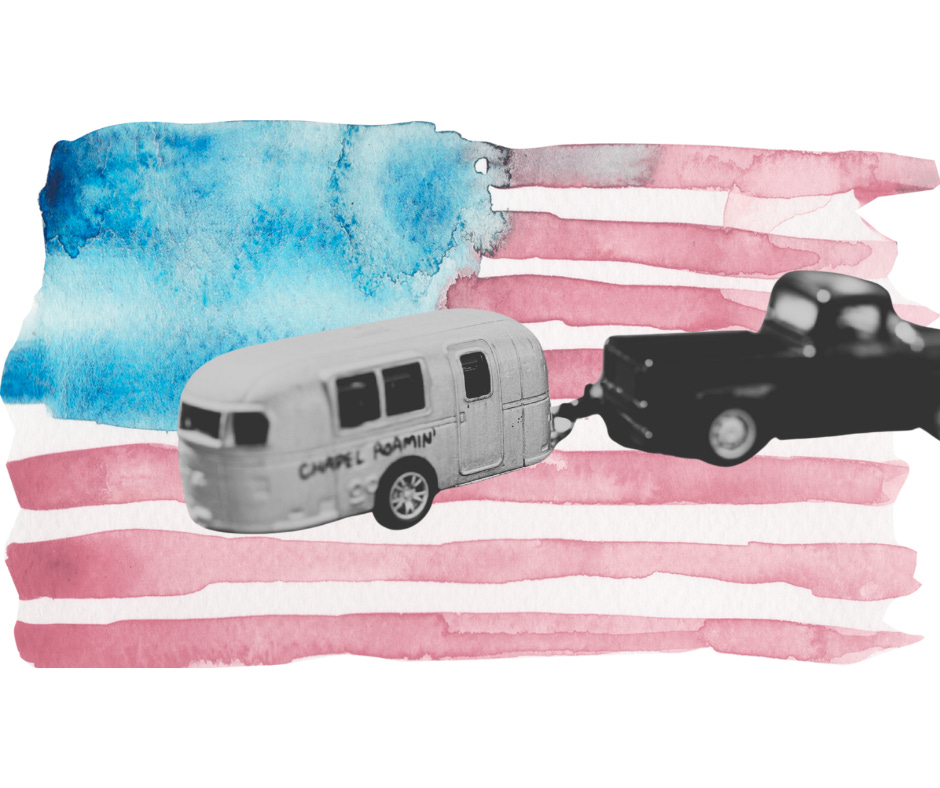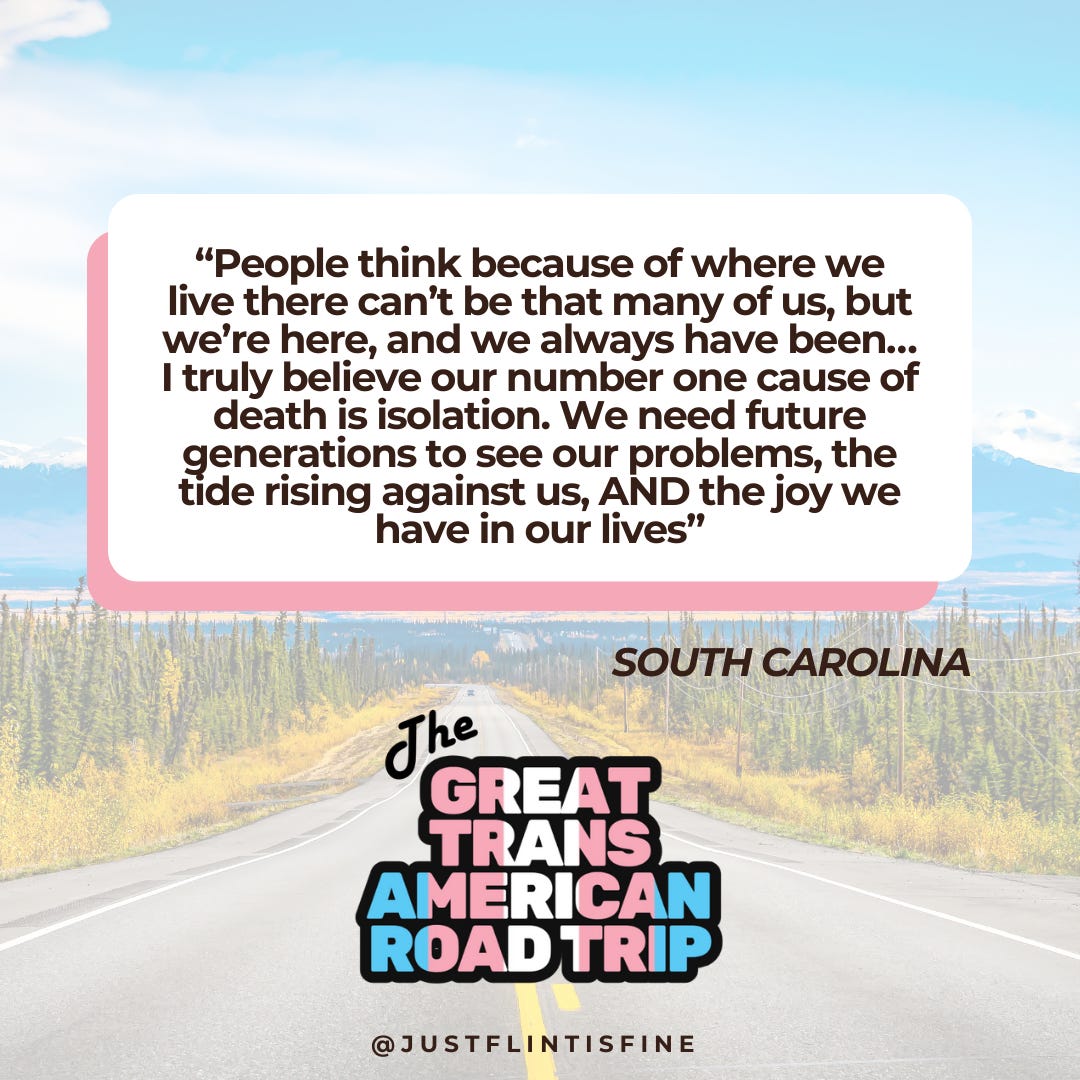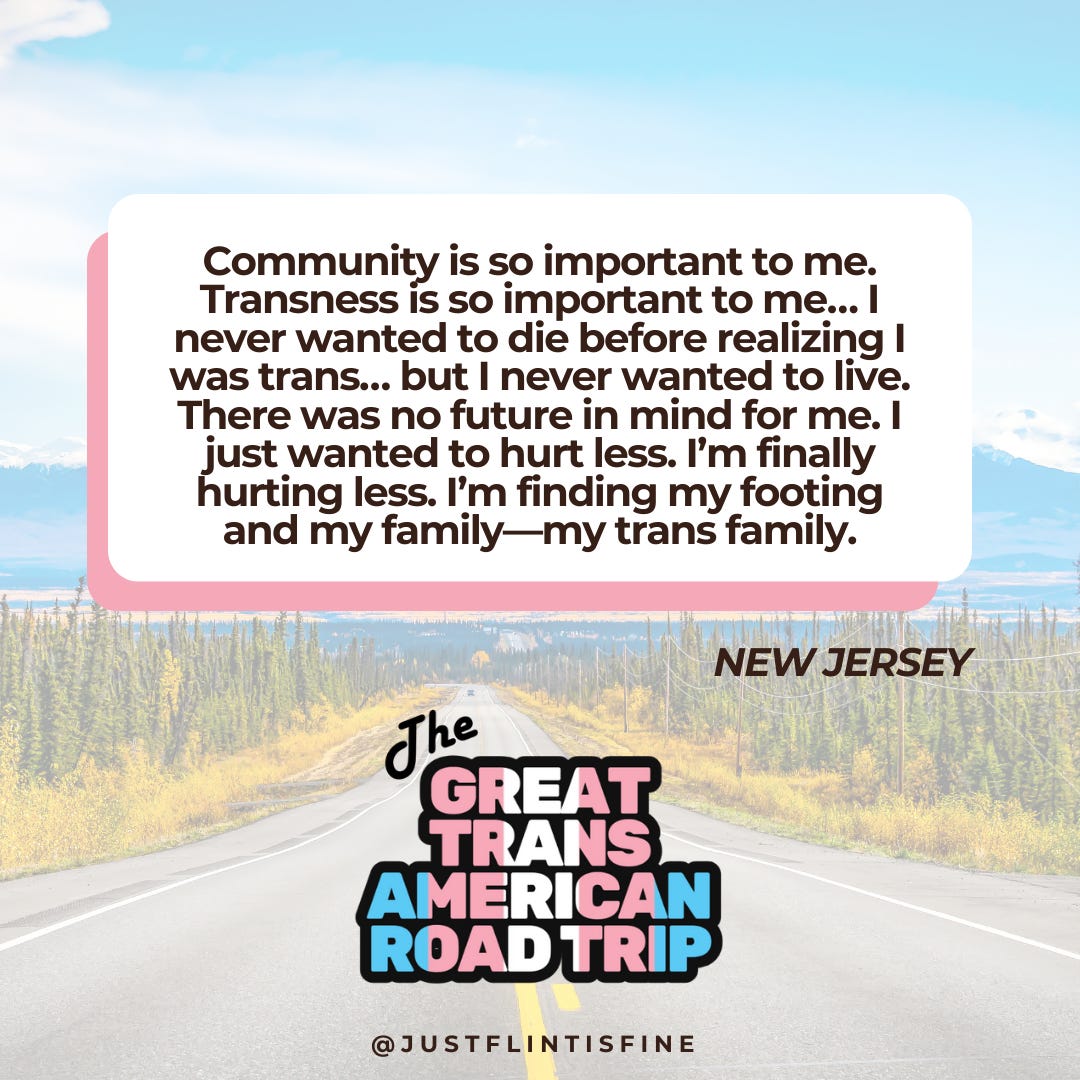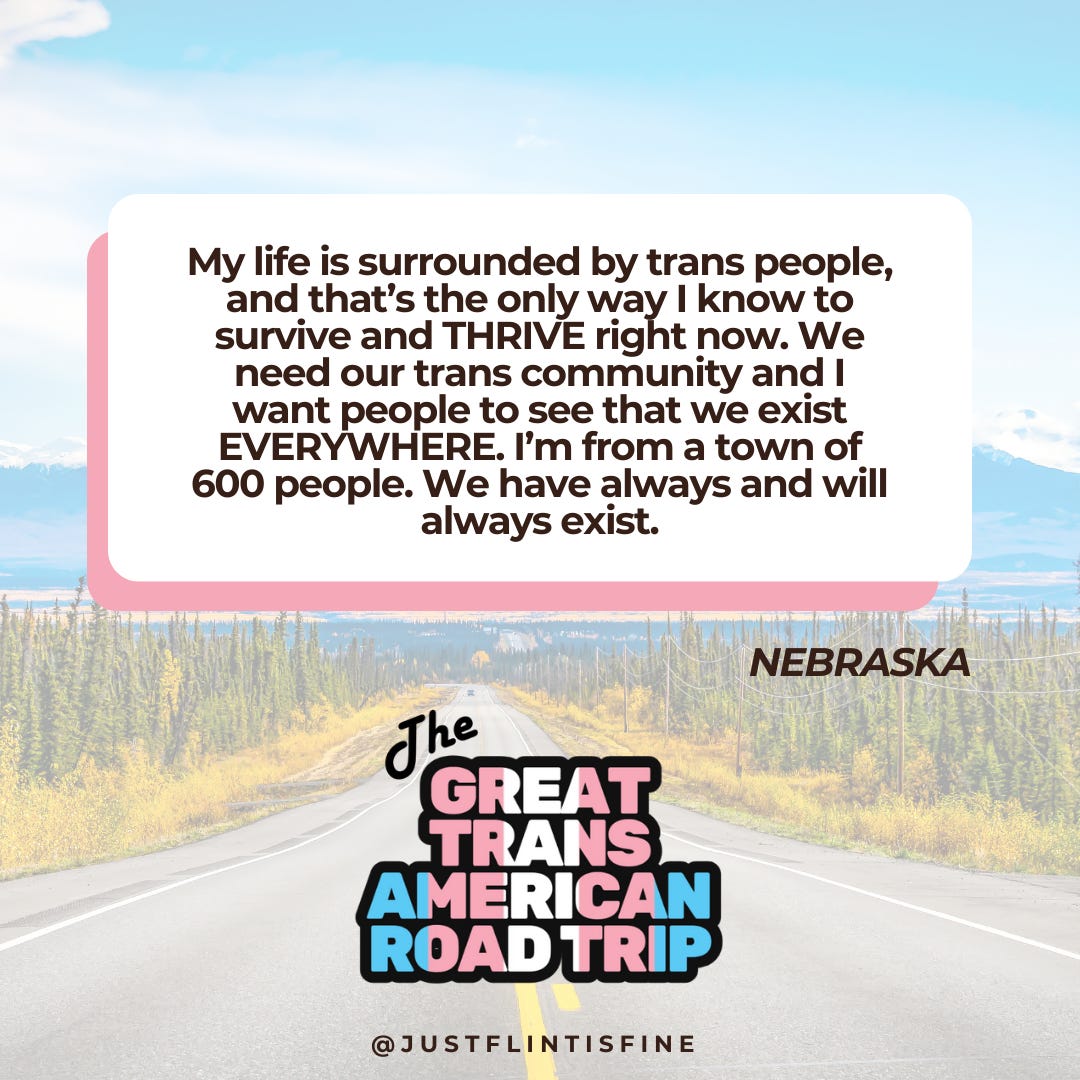Who Would Go On A Trans American Road Trip?
Is this the dumbest time for a trans person to travel? Maybe, but we’re doing it anyway.
There’s this image that’s been making the rounds in progressive digital spaces over this last year, and it’s pissed me off the whole time. It’s only recently, as my trans husband and I (his trans husband) have started our new life as full-time American nomads that I’ve really been able to articulate why.
You’ve definitely seen it: a partially obscured map of the continental United States (plus Hawaii), painted in dreamy blue water colors and paired with a play on the Dr. Seuss classic title “Oh, the Places You’ll Go!” The title has been altered, and now reads “Oh, the Places I’m Allowed to Go!” The bottom of the image clears up any remaining confusion. The map depicts “the only relatively safe states for trans people.” If you count up the states on the map, there are 22– just shy of half the union. It gets even more depressing when you factor in that the image first circulated more than 18 months ago– well before the earth shifted on its axis and started sliding directly into the sun.
Well, maybe that didn’t happen, but for trans people (and many, many others), it sure feels like it did.
As of this writing, the ACLU is tracking 575 anti-LGBTQ bills across the country, including ones like a proposal in Texas seeking to make trans identity akin to felony-level fraud. And in even just the first two weeks post-inauguration, the State Department halted gender marker changes on US passports, the CDC slashed funding to groups and studies using “forbidden words” such as “gender” and “LGBT”, the Equal Employment Opportunity Commission (EEOC) indefinitely paused claims related to gender identity or sexual orientation, public schools were threatened with pulled funding for promoting “indoctrination” based on “gender ideology and discriminatory equity ideology”, the executive branch issued a healthcare ban for trans youth that includes individuals up to age 19 (and since, a ton of hospitals abruptly stopped care), and a federal bathroom ban threatened to prosecute any person using a facility on federal property that does not align with their sex at birth.
In short, it’s rough as hell out here.
And yet–
I know a trans woman in Texas who is still showing up to drag shows every weekend, and caring for a group of young adults who have become her primary family.
I know a trans guy in Florida who is trying for a baby with his partner as he works full time in an aerospace job.
In fact, I know trans people in every corner of the country who are still showing up and being trans anyway. And that’s because no matter what maps or laws or presidents say, there isn’t a single state in the country that produces fewer trans people than the others. And the number of bills and laws and angry politicians per capita only tell the tiniest fraction of the story of what it really means to be a transgender American anywhere.
I found a lot of these people when I was teaching, because working in a primarily conservative school district in a suburban culture desert made me feel like I might be the only trans person on earth. There are a lot of people experiencing this now– trans folks of every age who think they’re alone, who think that because their government is trying to erase them, they are close to being erased. And they’re not.
And my husband and I are now in the unique position to do something about it.
Xilo (pronounced “shy - low”, a shortening of the Nahuatl name “Xilonen”) and I recently took a strong and unexpected pivot away from the life we’d constructed for ourselves in the California desert. We went from living a quiet farm life after a decades-long career as educators to finding ourselves without a permanent home again. As married trans men, we realized just how limited our options had become. There were no states where we felt particularly “safe,” and our lives as full-time self-employed renaissance men meant that we weren’t tethered to one place over another.
“Should we just buy an Airstream, or…?”
And so we did. To my father’s horror, I liquidated the retirement I’d spent a decade saving, bought a long aluminum tube and traded in my truck, and set out on a fully nomadic life.
And while we had fewer options than we’d ever had in our lives, we suddenly felt freer than ever before. Both of us were tired of running, tired of jumping from rental to rental, and tired of feeling like our fates belonged to someone else.
This country, we decided, belongs to us too.
Instead of running, what if we doubled down and worked to link up the vibrant chain of trans lives that has been and always will be here?
And so the Great Trans American Road Trip was born.
If there’s anything I’ve learned about trans people over the last two months and twelve hundred miles, it’s that we know how to make a bucket of rotting lemons into $19 lemon drop martinis.
For Xilo and I, that meant starting from the inside out.
We bought our 2020 Airstream Flying Cloud from a younger Boomer couple who left it largely the way it rolled off the lot. Since then, we’ve made it our home in a way only we can. Parked behind a work shed on a friend’s rural property and buried in snow, we gutted much of the inside and started making our trailer our own, and on a budget of very close to $0. We’ve turned our 27 foot “Chapel Roamin’” into a beautiful, mobile trans sanctuary. From paper mache truck nuts shaped like vials of testosterone, a seven foot tall vibrant green beanstalk disappearing into purple clouds by our stove, a silver tap below our sink spilling rainbow goop onto the laminated floor, half a dozen hidden fairy doors that open into galaxies and cartoon forests… It looks very much like a Meow Wolf childrens’ library.
Trans people are like that – we like to take control of the joy in our lives.
And now that our home feels like ours, we’re traveling the country to meet our trans siblings and see how they’ve made their home in a country that is making bolder and bolder moves to erase them completely.
Every month, we’ll be in a different part of the country meeting and interviewing trans people living radically different lives– surviving however they can and thriving in their own way. We’ll talk to artists, poets, lawyers, therapists, teachers, florists, baristas, business owners, students, and musicians. All with families, on their own, in multigenerational homes and first apartments and reservations and halfway houses, on the ocean and in the mountains and in rain and sleet and snow– we want to meet them all. And as we learn about them, we’ll sort through our own ever-changing reality too. How do we confront the hundred new problems that pop up every day in a house that routinely braves the equivalent of an 8.5 earthquake? How will we find consistent access to medications and healthcare as we travel through places without them? How will we live together in harmony (and preserve our marriage) in such a small space? And what will we do when we realize there’s a literal mountain of toilet paper in the black tank?
Every trans person who’s heard about our project has more they want to add: what does it take to travel safely between states, or across international borders, right now? Where can we find each other, and where should we avoid? What truck stop bathrooms are the least disgusting from sea to shining sea?
We’ll tackle it all, and we’ve already started.
Earlier this week, we put out a video announcing the Great American Road Trip on Instagram and TikTok, along with a little form for anyone who might want to be interviewed as we go. In less than 24 hours, we’d heard from more than 300 of our siblings across the continent, and half again as many allies who wanted to find a way to support the work. They wanted to share about their experiences, but they also wanted to open up their homes, lend us their laundry machines, and give us a place to take a long, hot shower (God, I miss those so much already).
It reminded me why this was something we wanted to do in the first place. Yes, we want to help eradicate the loneliness, isolation, and hopelessness that trans people are experiencing right now, but it’s also so important to accept love back in return.
Part of me still can’t believe we did it, and are still doing it– this life that is so different from the one I planned. I picture the shell of a person I was when I was so sure there was no one else on earth who understood what I was feeling. But being trans has given me the freedom to divorce from what is expected of me… it’s allowed me to see beyond what was promised to what is possible.
There are a lot of people in this country who want us to disappear, to feel unwelcome and cornered in our own home. But we don’t have to shrink down as the walls close in. We can be at home no matter where we go. We can decide that when they try to take everything, that power doesn’t belong to them.
If you want to be interviewed as a part of the Great Trans American Road Trip (or if you have something/somewhere to share with us), consider filling out our GTART master form!









omg i want to be a travelling nomadic healer
This is so beautiful and so powerful. Thank you for sharing it with us.